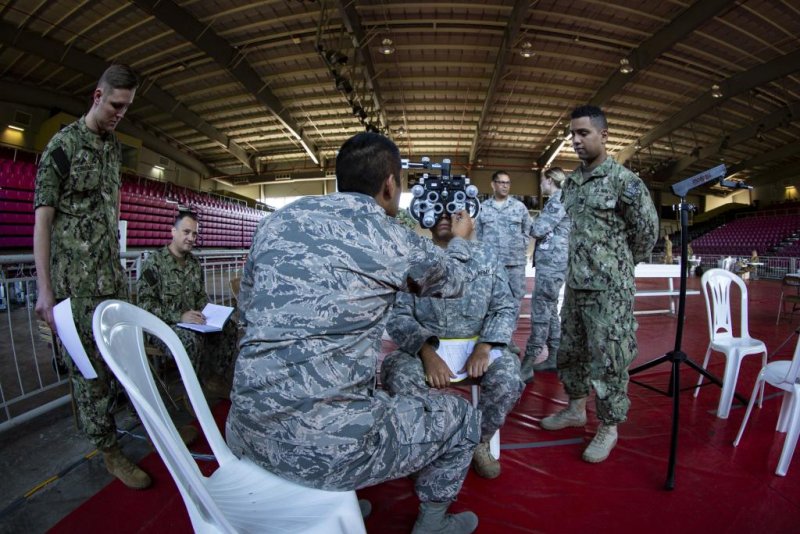Service members practice the procedures of receiving patients at the optometry station at Ponce, Puerto Rico, on Friday during Innovative Readiness Training. Photo by Sgt. Andy Martinez/U.S. Marines
April 29 (UPI) -- U.S. military medical personnel, including physicians, dentists and optometrists, are participating in Innovative Readiness Training in Puerto Rico.
The IRT's Ola de Esperanza Sanadora from Thursday though May 8 includes members of the Marine Force Reserves, Army National Guard, Army Reserve, Air National Guard, Navy Reserve, Air Force Reserve, Active Duty Navy and Army.
Ola de Esperanza Sanadora is Spanish for Healing Wave of Hope.
"We have approximately 500 participants supporting this IRT," U.S. Navy Capt. James T. Quinn, an administration officer and pediatric dentist with 4th Dental Battalion, said in a Marine Corps news release. "The service members are here to increase our mission readiness by acquiring more training hours as well as providing a service at no cost to the local communities."
During the two-week deployment, more than 9,000 medical procedures will be performed in the program that "leverages military contributions and community resources to multiply value and cost savings for participants," Lt. Col. Carlos M. Cuebas, with the U.S. Army Reserve Virgin Islands & Puerto Rico, told Fox News.
Services include physical exams, sports physicals, blood pressure/disease screenings, dental exams, extractions and fillings, and vision screenings.
The program began in 1992 when the Department of Defense searched for innovative programs to serve American communities in need and provide realistic military training benefits. Healthcare, infrastructure support and youth training programs are the three primary areas of emphasis.
"Without this IRT program, the sailors, and other participating units wouldn't receive the valuable hands-on training programs like this provides us," Quinn said.
And the different military branches get to work together.
"IRTs are unique because it provides realistic training in a joint environment," Quinn said. "We never know when the next crisis at home or abroad will show up and we must be ready for that at any moment. Training opportunities such as this help us prepare for the unknown."
Twenty-five sailors from 4th Dental Battalion Reserve are involved in the IRT.
"As reservists we don't get a lot of hands on time with the equipment unless we do this profession in the civilian world too," Quinn said. "This is a good opportunity for us to operate and challenge ourselves. We get to compare and contrast how the other branches work and reach a common goal together."
The program allows for hands-on, real-world training
"There are many dentist, medical personnel, and optometrist from across the U.S. that have ample experience in their field," Quinn said. "We can pass our knowledge to the next generation of sailors and service members that are still new to this.
Puerto Rico was heavily damaged when Hurricane Maria hit the island on Sept. 20, 2017. The military branches assisted the local government and the Federal Emergency Management Agency with relief efforts, including medical, power, housing and infrastructure needs.
Nearly 20,000 troops, including active duty, reserves and Puerto Rico's National Guard, were deployed to the island, according to Military.com.
"This project is not only helping increase the health of the community but it is really helping to sustain the community and their culture," Quinn said. "At the end of the day, I like seeing the people receiving our services are grateful and support what the service members are doing in Puerto Rico."















